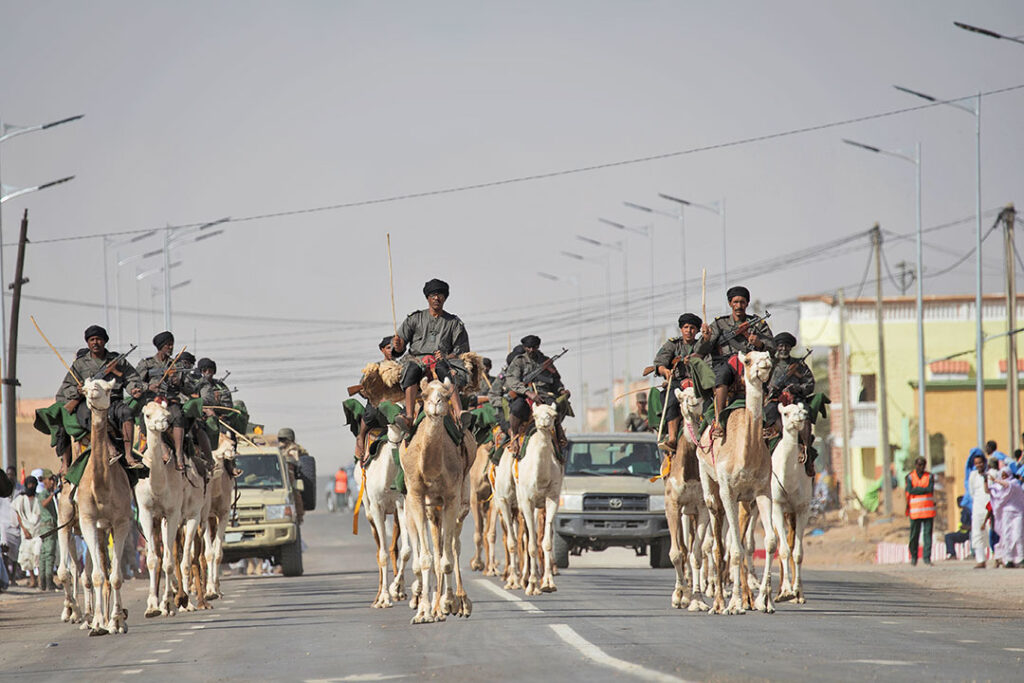ADF STAFF
The primary job of Mauritania’s 300 camel-riding Mehari National Guard members is to patrol remote areas of the Sahara along the border with Mali, looking for terrorist cells. But they do much more than provide security to villages and nomadic outposts.
The camel riders, dressed in traditional attire, provide vital information, public transport and help with access to clean water. They can offer sophisticated health care, such as diagnosing conditions and giving the proper medicine. Many describe the work as a higher calling.
“The most beautiful day for me is when I am assigned a mission, whatever it is,” a guard member told Radio France Internationale (RFI). “It can be a security mission or a mission of raising awareness, like teaching about illnesses, the dangers of illegal immigration or drug trafficking. Whatever the mission, I accomplish it by any means.”
They also gather intelligence on terrorists and serve as goodwill ambassadors on behalf of the government. One Guardsman told DW News that some of the riders will go undercover in markets, looking for unusually large purchases of fuel and supplies. In some cases, the information is passed on to the government, which deploys anti-terrorism units.
The riders go into the desert for months at a time, camping out at night. They are known as Meharists, derived from the French and Arabic words for desert camels.
The response to the camel riders has been overwhelmingly positive. The riders are known and trusted by the communities they serve and are a source of civic pride. The remote communities, which have long complained that their country is ignoring them, are grateful to see evidence of federal authorities reaching out to help them.
“The nomadic grouping of the National Guard does a lot for us,” one resident told Africanews. “Before we had a water network, they were the ones supplying us with water. Since they have been here, we feel safe. They give free consultations and distribute free medicine to (the community of) Achemime.”
Police on camelback are nothing new to the region; the practice is 100 years old. The members of this modern “camel corps” were recruited from local nomads, and authorities say they plan to add 200 more.
This force might be relatively small, but it addresses two problems that Mauritania and many other African nations face: how to include minority ethnic groups in providing services and how to secure and offer services to people in remote areas.
“The Meharists are part of a tradition of the Mauritanian nation. They are one of the emblems of our country,” a corps member told RFI. “I joined because our mission is noble. Going among the population of nomads to spread awareness, to inform them and to offer education to a population that doesn’t know how to read or write. There are also armed operations to bring security.”
ISOLATED AND MARGINALIZED
The sheer size of the African continent has led to a problem often described as the “tyranny of distance.” Many nations have rural ethnic communities living far away from population centers. They often are further isolated by a lack of roads. These remote communities and villages often get very little in the way of benefits and help from the central government. In turn, these communities come to resent the lack of support and protection, making them susceptible to recruitment by extremist groups.
In a 1997 study, the Brookings Institution said that virtually every African conflict had some sort of ethno-regional dimension to it.
“Even those conflicts that may appear to be free of ethnic concerns involve factions and alliances built around ethnic loyalties,” Brookings reported. “Analysts have tended to have one of two views of the role of ethnicity in these conflicts. Some see ethnicity as a source of conflict; others see it as a tool used by political entrepreneurs to promote their ambitions. In reality, it is both.”
Ethnic disputes have even led to civil wars in countries such as the Democratic Republic of the Congo, Liberia, Rwanda, Somalia and Uganda.
REACHING OUT TO ETHNIC GROUPS
The camel corps is just one answer to the problem of how to reach out to marginalized groups. Countries that have made the effort believe it leads to greater security and prosperity in targeted regions. Since these communities often are near borders, the outreach pays off in another way: by turning hostile groups into allies. These border communities can serve as the first line of defense to warn the government of incursions by extremists or traffickers.
In Mauritania, the government has gone a step further in helping nomadic communities establish new towns in the eastern part of the country, where they can receive services and stability while preserving a traditional way of life.
“The intent is not to abolish nomadism — men continue to live in semi-nomadic surroundings around their herd while their families are settled in one place, benefiting from education services and other basic amenities — but to create focal sites and defensible positions in the immediate vicinity of the Malian border,” Sahelian counterterror expert Anouar Boukhars wrote for the Africa Center for Strategic Studies (ACSS).
Boukhars said the engagement is paying dividends. “This strategy of community engagement in remote areas of the desert has been a critical component of the counterterrorism approach,” he wrote.
The country’s camel-riding ambassadors plan to continue expanding their program to meet the needs of more at-risk people.
“Where the state doesn’t have any infrastructure in remote and isolated areas, we’re coming to help in terms of sanitation and education,” camel corps commander Col. Abderrahamane El Khalil told ACSS.

